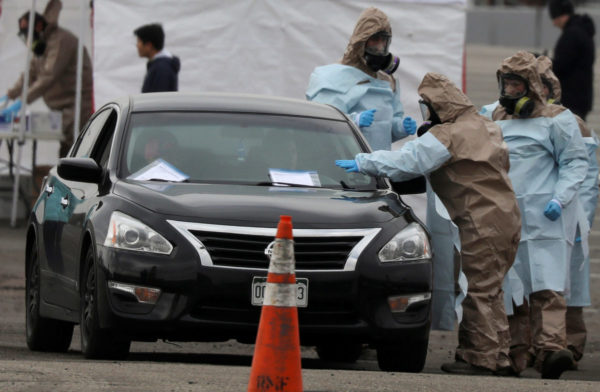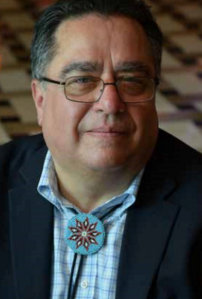
- Details
- By Levi Rickert
Opinion
On a recent Friday, I attended the Michigan Indian Education Council’s 2020 Native American Critical Issues conference in Grand Rapids. One attendee asked me if the coronavirus was just media hype or was it a real concern.
I told her I did not think the media was hyping it up, as is sometimes the case with winter storms in Michigan when 18 inches are forecasted by local television meteorologists and you wake on a Saturday with only a trace of snow on the ground.
I continued, telling I don’t think the coronavirus was like Y2K when people hoarded essentials in fear of a catastrophe at the stroke of midnight as the world moved into the year 2000. Nothing happened then. Reflecting back now, the turn-of-the-millennium media hype seems silly.
Last week, we learned the novel COVID-19 (coronavirus) is much different and is a real threat. Unlike the Y2K media hype, people are dying. And, I believe if it is not taken seriously, millions could die around the globe.
On Wednesday, the World Health Organization (WHO) labeled the epidemic a pandemic, which means it is world-wide and out of control.
The coronavirus has hit Indian Country on the Yankton Nation in South Dakota. It touched the Lummi Nation in Washington State. On Saturday, several Indian-gaming casinos announced temporary closures of their facilities. More are expected to close and perhaps they all should close.
The unimaginable—even a week ago—happened with the closing of Disneyland in California and Disneyworld in Florida. Some 25 million students are out of school. Professional sports leagues suspended their play in basketball, hockey and baseball. University and college campuses went virtual for the rest of the semester. Broadway cancelled plays. The stock market has faced day after day of major losses. Many churches that outnumber 250 normal weekly attendance went to livestreaming their services.
Common sense suggests there is much more to what is happening with this virus than what meets the eye.
Many health experts compare what is happening now to the 1918 flu epidemic that left 50 million dead globally, wiping out one-fifth of the world’s population. The difference between then and now is medical science and public health, particularly in the United States, is much more advanced. There are ventilators and other advances that will hopefully curtail the death rate.
Unfortunately, COVID-19 doesn’t yet have a vaccine, which is a problem. Therefore, older adults above 60 years old and those with existing ailments, such as heart disease, diabetes, cancer and kidney disease, are much more vulnerable and the coronavirus can be deadly.
So, caution is in order. Social distancing is in order to eliminate the rapid spread of the virus.
 Levi Rickert
Levi Rickert
Tribes in Indian Country have been working with Indian Health Service, the Department of Health and Human Services, the Center for Disease Controls and Prevention (CDC), state and local health officials to properly keep abreast of the proper course of action within their own tribes as they still maintain their tribal sovereignty and self-governance.
This past week made me reflect on how the smallpox was wrapped in blankets and given to our ancestors, long before it was called biological warfare. Even with the planned genocide, American Indians survived because we are resilient, strong and survivors.
“We have overcome tougher times. We persevered. We are overcomers,” Navajo Nation President Jonathan Nez said Friday during a press conference updating his nation on the deadly virus. He mentioned tuberculosis. In 1955, Navajo Nation had 200 confirmed cases of the disease. The message was the Navajo are survivors.
Also, on Friday, the American Indian Community House in New York City reposted the following from Muskrat Sabe on its Facebook page:
“The Elders have stated:
This sickness has a spirit, just like fear has a spirit, do not feed it fear. Use your medicines, boil cedar (clean the air), make teas (ratroot/Chaga), don’t just make these medicines or burn them, talk to them, tell them what you need. Smudge your homes, pray with good energy.
Pray and ask the spirit of that sickness not to hurt our people. They said now is a time to pray, to create a powerful, strong relationship with the water, the earth, the elements and the medicines.
Scientific Fact: Stress and fear lower the immune system and make you more susceptible to sickness.”
I agree. We should not feed fear, but act with caution. We should take care of our elders and ourselves to stay strong as a people.
Levi Rickert (Prairie Band Potawatomi Nation) is publisher and editor of Native News Online.
More Stories Like This
Native News Weekly (August 25, 2024): D.C. BriefsUS Presidents in Their Own Words Concerning American Indians
Next on Native Bidaské: Preserving Indian Health with A.C. Locklear
Hozhonigo Institute Helps Drive $34.5M in Grant Pipeline for Tribal Communities
Torres, LaMalfa Lead Push to Safeguard Culturally Important Tribal Seed Varieties
Help us defend tribal sovereignty.
At Native News Online, our mission is rooted in telling the stories that strengthen sovereignty and uplift Indigenous voices — not just at year’s end, but every single day.
Because of your generosity last year, we were able to keep our reporters on the ground in tribal communities, at national gatherings and in the halls of Congress — covering the issues that matter most to Indian Country: sovereignty, culture, education, health and economic opportunity.
That support sustained us through a tough year in 2025. Now, as we look to the year ahead, we need your help right now to ensure warrior journalism remains strong — reporting that defends tribal sovereignty, amplifies Native truth, and holds power accountable.
 The stakes couldn't be higher. Your support keeps Native voices heard, Native stories told and Native sovereignty defended.
The stakes couldn't be higher. Your support keeps Native voices heard, Native stories told and Native sovereignty defended.
Stand with Warrior Journalism today.
Levi Rickert (Potawatomi), Editor & Publisher

